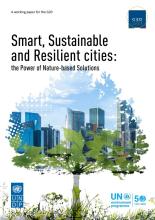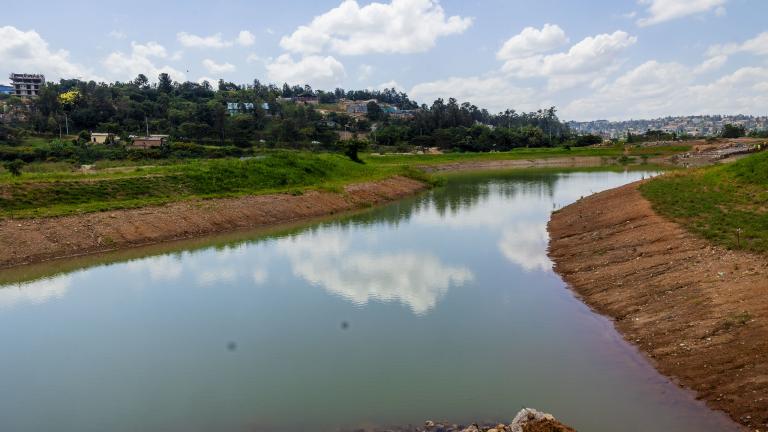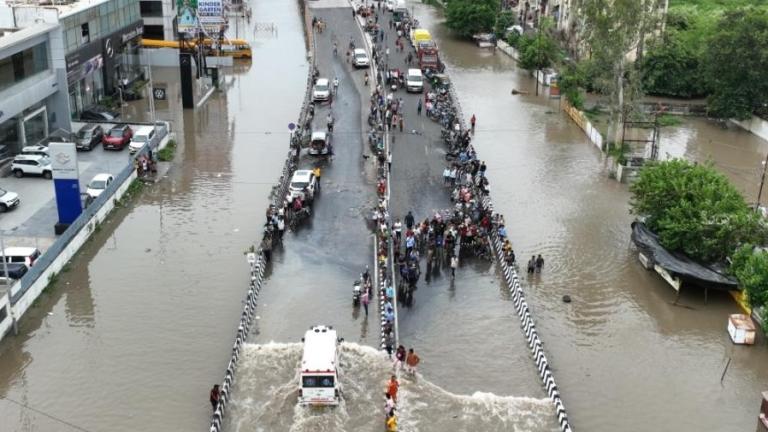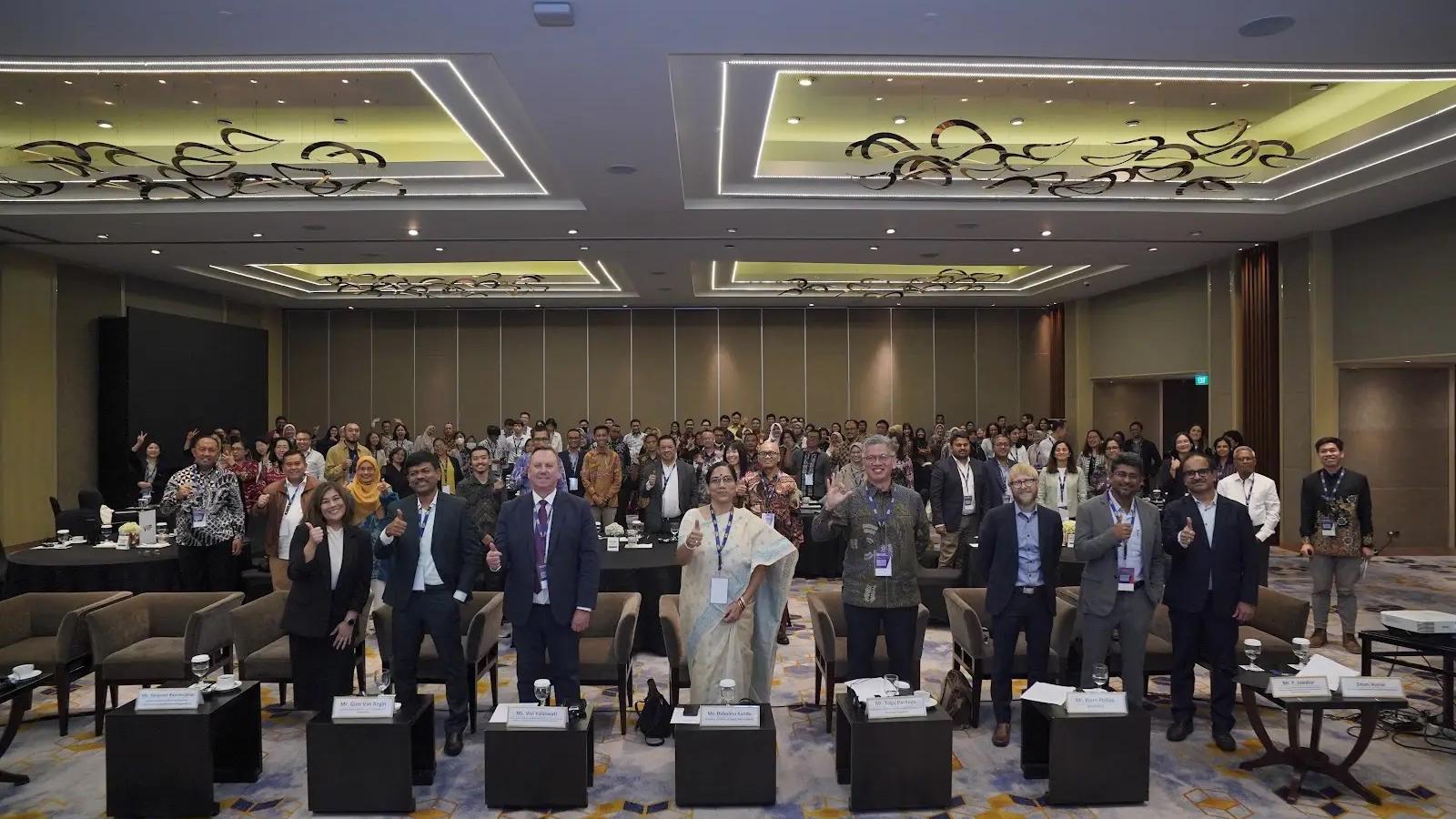UrbanShift Indonesia City Academy: A Thematic Exploration of Sustainable Urban Development in Asian cities
As cities in Asia face mounting challenges with rapid expansion and climate change, this in-depth training offered valuable insights on nature-based solutions, circular economy, and integrated climate action planning.
Photo: Bahasa Global
The UrbanShift Indonesia City Academy, held in Jakarta from August 27 to 29, 2024, brought together around 100 urban leaders, planners, and sustainability experts from Indonesia, India, China, Philippines and Malaysia to address critical challenges that rapidly urbanizing regions are facing. Over three days, participants engaged in intensive training sessions and workshops focused on three themes: Nature-based Solutions (NbS), Circular Economy, and Integrated Climate Action Planning (ICAP).
Nature-based Solutions: Harnessing the power of nature for urban resilience
One of the focus themes of the City Academy was Nature-based Solutions (NbS), a concept increasingly recognized for its potential to address environmental challenges while providing social and economic benefits. In the context of Indonesia—a country highly vulnerable to climate risks such as extreme weather events, rising sea levels, and flooding—NbS offer a critical avenue for building urban resilience.
This training focused on equipping city leaders with the knowledge and tools necessary to make the economic case for these solutions, a crucial step in securing the financing needed for large-scale implementation. For instance, John-Rob Pool from the World Resources Institute (WRI) introduced participants to the UrbanShift & Cities4Forests Cities Indicators Dashboard. This tool provides data-based evidence to demonstrate how specific interventions can lead to tangible benefits for urban populations, thereby strengthening the case for investment in NbS.
Real-world examples played a central role in these discussions. Dr. Nisha Priya Mani from Chennai's Municipal Corporation shared the city’s efforts to restore degraded water bodies with support from international organizations like the Global Environment Facility and the Asian Development Bank (ADB). This project not only enhances urban resilience but also serves as a model for other cities in Asia seeking to leverage international support for NbS initiatives.
To address Jakarta’s challenges with flooding, Dominika Wara Christiana and Yudhistira Satya Pribadi of WRI Indonesia demonstrated how to conduct a suitability analysis to determine the potential efficacy of an NbS approach. Their analysis highlighted the loss of agricultural and natural lands to urban development over the past two decades and demonstrated how NbS could mitigate these impacts. Participants were also engaged in hands-on exercises to develop their own costs and benefits inventory for NbS projects, further solidifying their understanding of the practical application of these solutions.
Circular Economy: Transforming waste into resources
The Circular Economy course guided participants through the concept of redefining growth by decoupling economic activity from the consumption of finite resources. Given the significant waste management challenges in rapidly urbanizing Asian cities, the circular economy has tremendous potential to offer a sustainable model for resource efficiency and waste reduction.
Led by ICLEI, this training set the stage with presentations from cities that are pioneering innovative approaches to waste management and resource efficiency. Grace Cadwising from the Philippines' City Government of Baguio showcased how the city has responded to the resource strain caused by a tourism-driven fourfold increase in its daytime population. Baguio’s approach includes centralizing material recovery facilities and banning single-use plastics, which has significantly reduced the city’s environmental footprint. Similarly, Chen Ouyan shared Beijing’s leading efforts in implementing innovative waste management and resource efficiency practices, part of China’s ambitious goal to create 100 zero-waste cities by 2025. Meanwhile, Balikpapan in Indonesia is integrating solid waste management with energy generation from organic waste, an innovative approach that not only addresses waste management but also contributes to the city’s energy needs.
The role of well-established companies or young startups in advancing the circular economy was another key topic. Rebricks Indonesia, for example, is transforming rejected plastics into bricks, a groundbreaking initiative that reduces plastic waste and contributes to lower carbon emissions. Linda Widiachristy from Saint-Gobain and Tito Aribowo from Green Building Council Indonesia discussed sustainable construction practices and introduced the Circular Building Playbook as a critical resource for achieving sustainability in the construction sector.
Towards the end, four success factors emerged: Institutional leadership, source reduction, public engagement, and land-sea coordination. These have been proven essential for scaling up circular economy practices and ensuring their long-term success in urban environments.
Integrated Climate Action Planning: Developing comprehensive roadmaps for climate resilience
The third major theme of the Indonesia City Academy was Integrated Climate Action Planning (ICAP), a crucial component of sustainable urban development. With cities responsible for 70% of global CO2 emissions, there is an urgent need for comprehensive climate action plans that are robust, science-based, and aligned with both national and global climate goals.
Led by C40 Cities, this course was designed to equip participants with the tools and strategies necessary to develop and implement effective climate action plans. The course emphasized coordinating with multiple levels of government, prioritizing impactful climate actions, and tracking progress to ensure that cities meet their climate targets.
Participants were introduced to best practices from cities that have successfully implemented ICAPs. For instance, Jakarta, Beijing, and Chennai shared their experiences in developing and executing climate action plans that address local sustainability challenges while contributing to broader environmental goals. These case studies showed climate action planning from initial development to implementation and monitoring.
Integrating climate action into cross-departmental urban planning also emerged as crucial. This approach ensures that climate considerations are embedded in all aspects of urban development, leading to more resilient and sustainable cities.
During the closing ceremony, Jawahar Packirisamy, Local Administration Department Commissioner for the Government of Puducherry reflected on the benefits of programs like UrbanShift, as he also attended the UrbanShift Asia Forum in New Delhi last September along with this City Academy, and aims to apply these learnings back in his city. "A simple test for a city is when the people visiting it go back with a smiling face and good memories and want to come back again,” he said. “My experience in Jakarta was pleasant and I will come back again. In my view, the era of megacities in my view is over; this is the age of secondary and tertiary cities. Hence there is a strong need for collaboration before these cities.”
The Indonesia City Academy was made possible through funding from the Global Environment Facility (GEF) and implemented through UrbanShift supported through the Global Platform of partners including UN Environment Programme, World Resources Institute, C40 Cities, and ICLEI. A special thanks to the Ministry of National Development Planning/Bappenas Republic of Indonesia for their sponsorship of the event and contributions as GEF-7 child project implementing agency. The UrbanShift Indonesia City Academy provided participants with a deep understanding of the key themes essential for sustainable urban development: Nature-based Solutions, Circular Economy, and Integrated Climate Action Planning. These themes are interconnected, and each play a vital role in creating cities that are resilient, inclusive, and environmentally sustainable.
As city leaders and practitioners return to their respective cities, they carry with them not only the knowledge and tools gained during the Academy but also a renewed commitment to driving sustainable urban transformation. As these cities continue to implement the strategies and solutions discussed in these three days, they will play a pivotal role in advancing both national and global sustainability goals.

Nature-Positive Tourism: How local leadership can balance conservation and economic growth
In this ICLEI-hosted webinar, learn how cities can protect natural ecosystems while generating revenue from sustainable tourism.

Smart, Sustainable and Resilient Cities
This working paper investigates the potential of nature-based solutions to help build smart, sustainable and resilient cities, drawing from the experience of G20 countries and beyond.

Breathing New Life into 5 Kigali Wetlands to Enhance Climate Resilience and Quality of Life
These formerly degraded sites will soon welcome visitors for recreational and educational opportunities—while alleviating flood challenges for the city.

Building City Capacities for Urban Resilience: Three Learning Modules to Tackle Climate Risks
These self-study courses guide city officials through best practices for assessing climate risks and mitigating flood and heat hazards.

